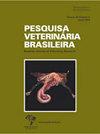巴西中西部马氏伯克氏菌血清学阳性马科马组织的病理学、微生物学和分子评价
IF 0.8
4区 农林科学
Q3 VETERINARY SCIENCES
引用次数: 0
摘要
摘要:马氏伯克氏菌是一种由马氏伯克氏菌引起的疾病,主要感染马、骡子和驴。这种疾病会导致皮肤、肺和其他几个器官的损伤。然而,它通常表现为无症状的疾病。在巴西,高灵敏度和特异性的血清学试验被用于协助检测针对马氏芽孢杆菌的抗体,并有助于控制该疾病。然而,由于对血清反应性动物的强制性安乐死,马氏杆菌血清学阳性和无症状的马科动物在饲养者、兽医和诊断实验室之间产生了很大的冲突。本研究阐明了补充诊断检测马氏芽孢杆菌的局限性。它描述了来自巴西马托格罗索州不同城市的24匹马的临床、形态学和实验室发现,这些马对补体固定试验有反应,并且在腺体的western印迹试验中呈阳性。收集了24匹马的数据和组织样本进行组织学、微生物学和分子分析。在23匹马中,没有临床症状、形态改变、微生物分离或分子检测可以表征马氏杆菌感染。另一方面,无病变改变的无症状马的样本在PCR中显示序列扩增与马氏双歧杆菌相容。考虑到巴西马托格罗索州马氏芽孢杆菌感染需要采取动物卫生防护措施,而且根据国际要求和国家立法,血清学结果应作为支持该细菌错误卫生程序的工具。本文章由计算机程序翻译,如有差异,请以英文原文为准。
Pathology, microbiology, and molecular evaluation of tissues from equids serologically positive for Burkholderia mallei in Midwestern Brazil
ABSTRACT: Glanders is a disease caused by the bacterium Burkholderia mallei that primarily affects horses, mules and donkeys. The disease can cause lesions in the skin, lungs and several other organs. However, it often manifests as an asymptomatic disease. In Brazil, serological tests of high sensitivity and specificity are used to assist in the detection of antibodies against B. mallei and to contribute to the control of the disease. However, due to the mandatory euthanasia of seroreactive animals, equids with positive serology for B. mallei and asymptomatic generated great conflicts between breeders, veterinarians and diagnostic laboratories. This study clarifies the limitations of complementary diagnostic tests for detecting B. mallei. It describes the clinical, morphological and laboratory findings in 24 equines from different municipalities in the Mato Grosso State, Brazil, which reacted to the complement fixation test and were positive in the western blotting test for glanders. Data and tissue samples were collected from 24 horses for histological, microbiological and molecular analysis. In 23 horses, no clinical signs, morphological alterations, microbiological isolation, or molecular detection would characterize B. mallei infection. On the other hand, samples from an asymptomatic horse without lesional alterations showed sequence amplification compatible with B. mallei in the PCR. Considering that the infection by B. mallei is subject to the application of animal sanitary defense measures and that, by international requirement and national legislation, the serological results are tools that should support the sanitation procedures for the error of the bacteria in the Mato Grosso State, Brazil.
求助全文
通过发布文献求助,成功后即可免费获取论文全文。
去求助
来源期刊

Pesquisa Veterinaria Brasileira
农林科学-兽医学
CiteScore
1.30
自引率
16.70%
发文量
41
审稿时长
9-18 weeks
期刊介绍:
Pesquisa Veterinária Brasileira - Brazilian Journal of Veterinary Research (http://www.pvb.com.br), edited by the Brazilian College of Animal Pathology in partnership with the Brazilian Agricultural Research Organization (Embrapa) and in collaboration with other veterinary scientific associations, publishes original papers on animal diseases and related subjects. Critical review articles should be written in support of original investigation. The editors assume that papers submitted are not being considered for publication in other journals and do not contain material which has already been published. Submitted papers are peer reviewed.
The abbreviated title of Pesquisa Veterinária Brasileira is Pesqui. Vet. Bras.
 求助内容:
求助内容: 应助结果提醒方式:
应助结果提醒方式:


